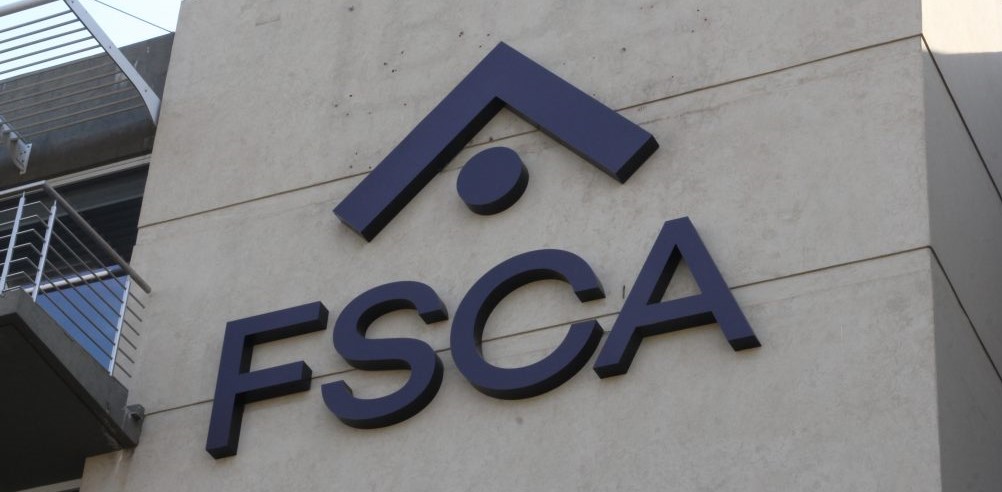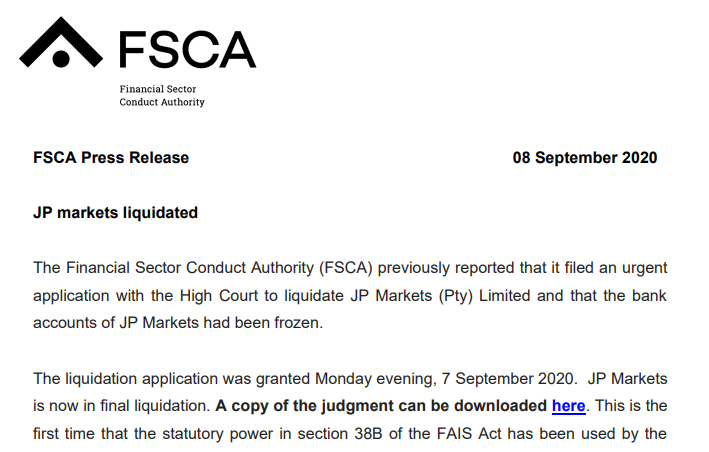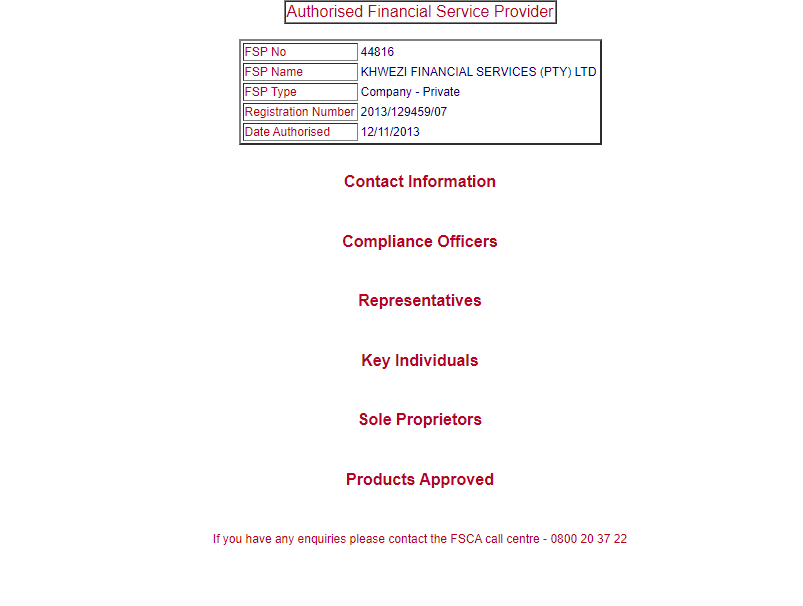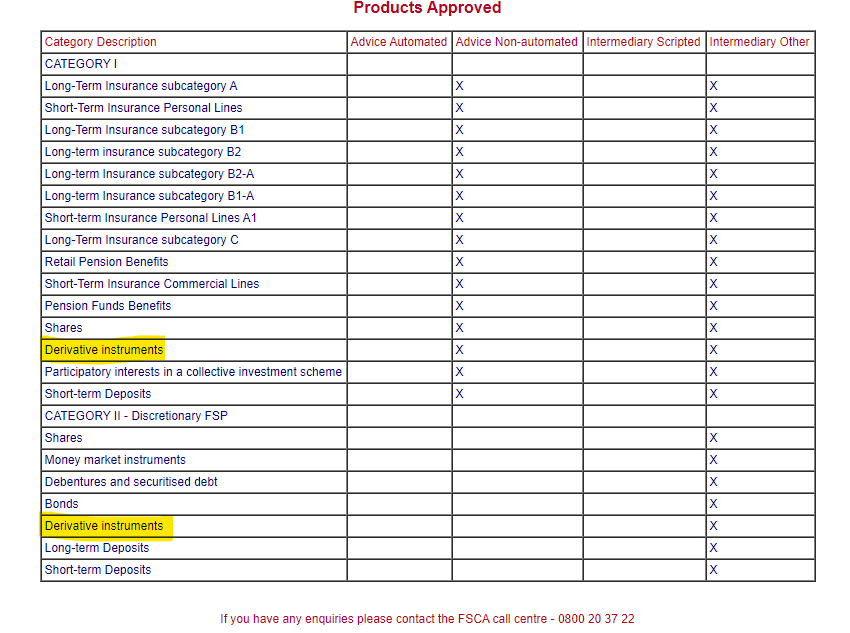Regulated Forex Brokers in South Africa
What is the FSCA?

The Financial Sector Conduct Authority or FSCA is the local regulator of all non-banking related activities and has oversight over all regulated brokers in South Africa.
Previously known as the Financial Services Board (FSB), the FSCA was founded in 1991 following the recommendations of Van der Horst committee. The committee recommended the creation of an independent body to supervise and regulate the non-banking financial services sector in South Africa.
In 2018, the FSB changed their name to the FSCA or the Financial Sector Conduct Authority. It is responsible for the market conduct regulation and supervision of financial service providers like Forex brokers, investment funds, and investment managers.
The Financial Sector Conduct Authority has the following four goals:
- Protect customers of financial services.
- Improve efficiency and integrity of financial markets.
- Promote financial stability.
- Increase financial inclusion.
To achieve these goals, it also creates regulations in the interest of the public and publishes warnings of illegal schemes.
Internationally, the Financial Sector Conduct Authority is a recognised member of the International Organization of Securities Commissions (IOSCO) and takes a leading role in regulation in the SADC block.
FSCA oversight of the Forex market
The FSCA's supervises activity in the Forex currency market to protect Forex traders from illegal actors and rogue brokers. If you want local protection when trading Forex in South Africa, you want your broker to be regulated locally by the FSCA. Regulation is the primary way to establish trust in a Forex broker.
The FSCA issues public warnings about fraudulent brokers in the regularly-updated Media Releases section of their website. These warnings include guidance on individuals or companies misrepresenting themselves, or organisations falsely representing their services.
This register of FSPs will also show if an entity has submitted an application to the FSCA, if they are in good standing, or if it has been stripped of regulation in the past.
Advantages of trading with an FSCA-regulated broker
All FSCA-regulated brokers must keep client funds segregated from operational funds. This ensures that in the case of broker bankruptcy, all client funds can be returned.
If your FSCA-regulated broker does go bankrupt, you will also be able to walk into any branch of your broker's local bank and remove all your funds from your segregated account. Gaining access to your funds will not be so easy in the event of a foreign broker's bankruptcy.
FSCA-regulated brokers must also have a physical office in South Africa and submit regular audits to the FSCA. This ensures that any disputes are governed by South African laws and that client funds are not being misused.
Having a physical office in South Africa allows brokers to partner with local banks, which are governed by South African laws. Local bank accounts also mean that bank transfers between South African clients and brokers are faster and cheaper.
South Africans can trade with brokers which are not regulated by the FSCA, but these organisations are not governed by South African institutions, and funds are not handled by local banks.
Over-the-counter Derivative Provider (ODP) licence
Since 2019, the FSCA has required all Forex brokers in South Africa to apply for an Over-the-counter Derivative Provider (ODP) licence. This has created a new set of requirements for South African Forex brokers to follow:
Due Diligence: Brokers now need to conduct due diligence on new traders before they can be allowed to trade. Clients will need to prove their capital adequacy before starting to trade. New traders must also show that they understand the risks involved.
Reporting: Every broker that has been authorised must also report the details of every transaction to an authorised trade repository. These transaction details include the names of the parties, the valuation of the transaction, the underlying asset of the trade, details of the instrument traded, and the margin that has been maintained.

Forex brokers who do not hold an ODP licence are in contravention of the regulations and can be liquidated at the request of the FSCA, as happened to JP Markets in September 2020 (see image above).
These new requirements have put the FSCA firmly in charge of the Forex industry in South Africa and will provide a much safer and more secure environment for traders.
How Do I Find Out If A Forex Broker Is FSCA Regulated?
All Forex brokers that are regulated by the FSCA are required to publish their Financial Service Provider (FSP) number on their website. KhweziTrade is a popular South African Forex broker, and we can see from the bottom of their website that their FSP number is 44816:

Once you have the FSP number of a broker you can go use the FSCA's search page to enter the FSP and verify that the broker is indeed licenced. You can see below that we have entered KhweziTrade's FSP as listed on their website.

Once we submit the FSP number via the FSCA's search page, we can see that there is a company called Khwezi Financial Services (Pty) Ltd with that FSP number.

A broker having a legal name different to their trading name is quite common, so it is sometimes difficult to search for a broker by trading name alone using this service. When you can, use the FSP number, or legal name if you know it.
If we click on the Details button, we then have a full overview of Khwezi Financial Services regulatory status:

The important part of this section for our purposes is the Products Approved section. Let us have a look at it in closer detail:

Here we can see that Khwezi Financial Services, as a large financial services company, holds a wide range of licences. We have highlighted the two product licences that matter for our purposes. We can see that they hold a Category I and a Category II licence for Derivative instruments.
All Forex trading is derivative trading, as traders never actually hold any currency – they are just speculating on a price derived from a real-world asset (such as the USD or the ZAR). So Khwezi Financial Services' two Derivative instruments licences allow them to provide derivatives (such as Forex derivatives) to traders.
If you are ever unsure whether a broker is FSCA regulated, the FSCA search page is the best place to find out. Be aware that some bad brokers will use names similar to licenced financial services companies so as to confuse people.
Which Brokers Are Regulated in South Africa?
Here is the full list of FSCA-regulated Forex brokers we have reviewed, ordered by their overall score.
Scroll for more details![]()
![]()
FSCA Strategy 2018-2022
Central to the mission of the FSCA arefour core statements, which together, form the reason why residents want to trade with an FSCA regulated Forex broker.
The FSCA improves the efficiency and integrity of the South African financial markets. By monitoring the whole financial market and not just any particular entity, it ensures the safety of the entire market, and in doing so, can protect all market participants including retail Forex traders.
In addition, the FSCA ensures that regulated brokers treat all clients fairly. A client of a regulated brokerage who feels they have been cheated has a legally defined process to resolve their issue. All regulated brokers must have this process available to potential clients.
FSCA-regulated brokers mustpresent written material in a way that does not confuse or mislead the reader. They are required to provide financial education and promote the financial literacy of potential clients. As financial products can be complicated, it is the obligation of all regulated members to explain all products and their associated risks.
Finally, the FSCA assist inmaintaining financial stability in South Africa by supervising the registered entities.
A client trading with an FSCA regulated broker should expect to be treated fairly, expect to be educated on financial products whenever needed, and can rest assured that the government is monitoring their broker's activities to ensure they are safe and secure.
History of the FSCA
Previously known as the Financial Services Board (FSB), the FSCA opened in 1991 following the recommendations of Van der Horst led committee. The committee had recommended the creation of an independent body to oversee or supervise and regulate the non-banking financial services sector in South Africa.
After the Van der Horst committee, various acts have increased and expanded the mandate of the Financial Services Board. In 2001, the Financial Intelligence Centre Act and the subsequent amendments that followed later increased the FSB mandate to include issues of combating money laundering.
Later in 2004, the Financial Advisory and Intermediary Services, also known as FAIS, expanded the role of FSB to include, among other things, the conduct of market in the banking sector.
As of April 1st, 2018, the FSB changed their name to the FSCA or the Financial Sector Conduct Authority which is responsible for market conduct regulation and supervision.
The FSCA Structure
A board oversees the Financial Sector Conduct Authority which executes its mandate through divisions. The FSCA has the sole mandate to select its own Commissioner, making the organisation less of a target of the financial politics and pressures. Apart from overseeing the day-to-day running of the institution, the Commissioner acts as the Registrar of the Non-banking Financial Institutions in South Africa.
The authority of the Commission is distributed to Deputy Commissioners appointed by the Minister of Finance, and are supported by the Chief Risk Officer, General Counsel, Media Liaison Officer.
Key Financial Sector Conduct Authority Responsibilities
As part of its mission of ensuring that the investment environment in South Africa is sound and conducive, the Financial Sector Conduct Authority has built a strong reputation for its regulatory framework in the following sectors:
- Capital Markets
- Insurers
- Financial Services Providers
- Collective Financial Schemes
- Nominee Companies
- Friendly Societies
- Retirement Funds
The FSCA ensures the cooperation of regulated entities and has the power to impose compensation orders, unlimited penalties and cost orders for those who do not comply. These orders are adhered to as though they are a judgment from South Africa's Supreme Court, and are a matter of public record.
A customer complaints service is effective in fielding complaints, plus a separate self-policing appeals board which any aggrieved entity can approach should they feel like they might have been aggrieved by either the regulator or any of its executive officers.
Summary
The FSCA is credited for bringing stability and transparency to South Africa's investment industries. Forex traders who want to have protection can find brokers that are locally regulated, and who comply with South African law. In some cases, South African clients can keep their funds locally, further increasing trust with the brokerages.
FAQs
Do South Africans have to trade with FSCA regulated brokers?
No, South Africans can legally trade with any broker in the world. We do recommend that you always trade with a well-regulated broker, regardless of the jurisdiction in which they operate.
Should I trade with an FSCA Regulated Broker?
While it is not essential for South Africans to trade with an FSCA regulated broker, local regulation ensures that in the case of broker bankruptcy your funds will be protected by local laws. FSCA regulation also ensures segregation of client and broker funds. Many FSCA regulated brokers also keep their accounts in local banks, resulting in faster deposits and withdrawals.
But there are many well-regulated international brokers who can offer better trading conditions, platform options and market analysis than most FSCA-regulated brokers.
If local protection is important to you, then you should trade with an FSCA regulated broker.
How do I know if a Forex broker is regulated by the FSCA?
Every broker regulated by the FSCA is required to post their FSP licence number on their website. If you know the broker's FSP number or legal name, you can also use the FSCA's search facility to check on their regulatory status.
Do FSCA regulated brokers offer ZAR trading accounts?
Not necessarily. While some FSCA regulated brokers offer ZAR trading accounts, most do not. If you are looking for a ZAR trading account, check out our page on the best ZAR trading accounts in South Africa.
Forex Risk Disclaimer
Trading Forex and CFDs is not suitable for all investors as it carries a high degree of risk to your capital: 75-90% of retail investors lose money trading these products.
Forex and CFD transactions involve high risk due to the following factors: Over-leveraging, unpredictable market volatility, slippage arising from a lack of liquidity, inadequate trading knowledge or experience, and a lack of regulatory protection for clients.
Traders should not deposit any money that is not disposable. Regardless of how much research you have done, or how confident you are in your trade, there is always a substantial risk of loss. (Learn more from the FCA or from ASIC)
Our Methodology
Our State of the Market Report and Broker Directory are the result of extensive research on over 100 Forex brokers. The explicit goal of these resources is to help traders find the best Forex brokers – and steer them away from the worst ones – with the benefit of accurate and up-to-date information.
With over 150 data points on each broker and over 3000 hours of research and review writing, we believe we have succeeded in our goal.
In a world where trading conditions and customer support can vary based on where you live, our broker reviews focus on the local trader and give you information about these brokers from your perspective.
All research has been conducted by our in-house team of researchers and writers, gathering information from various company representatives, websites and by sifting through the fine print. Learn more about how we rank brokers.
Regulated Forex Brokers in South Africa
Source: https://tradeforexsa.co.za/forex-brokers-south-africa/fsb/


Post a Comment